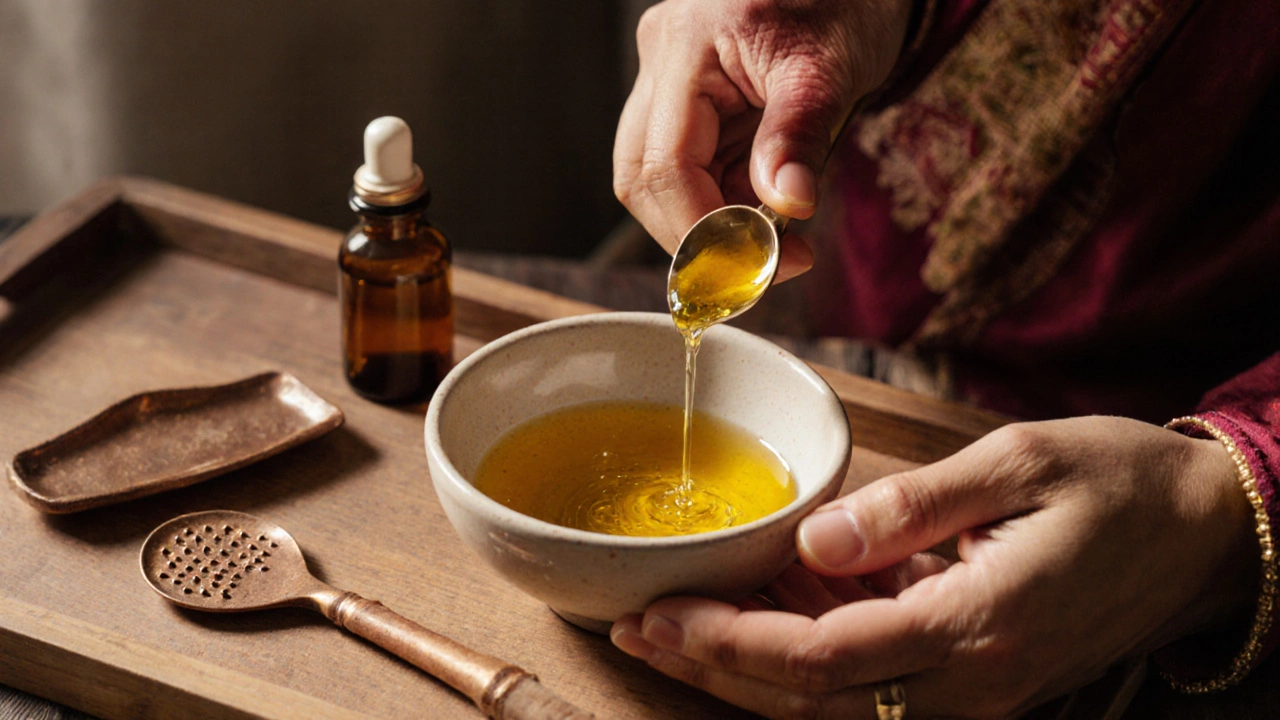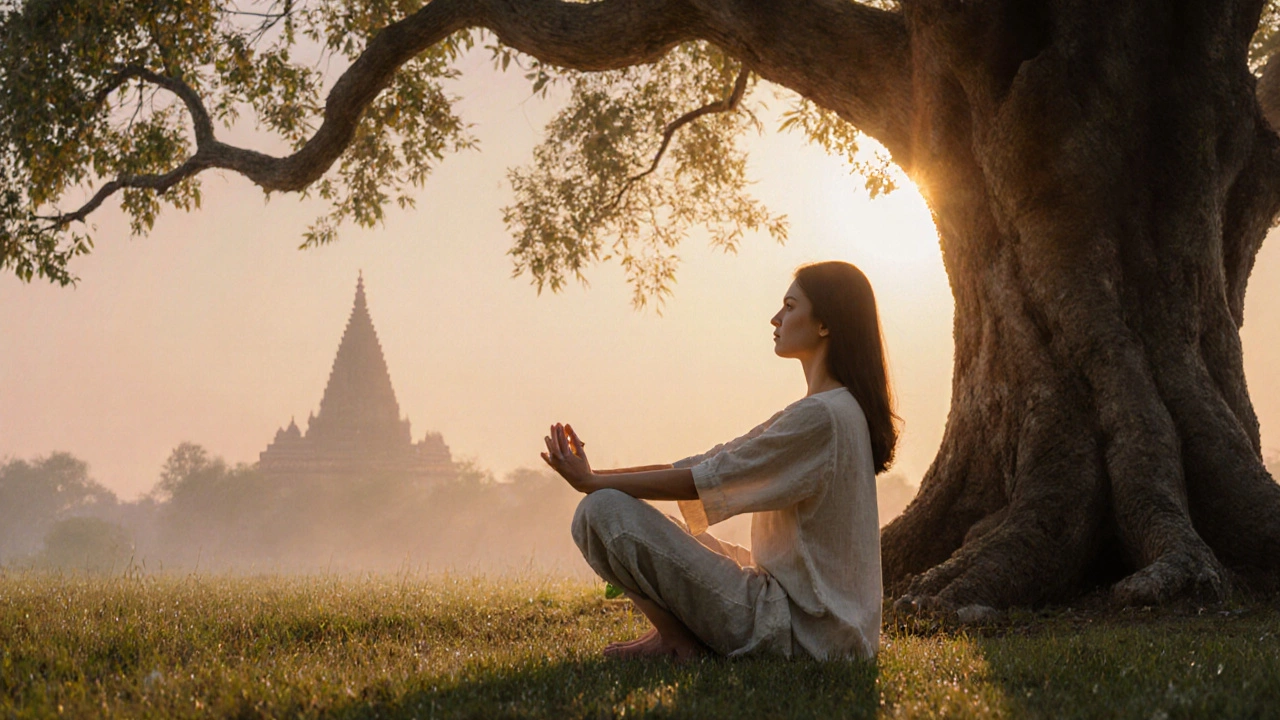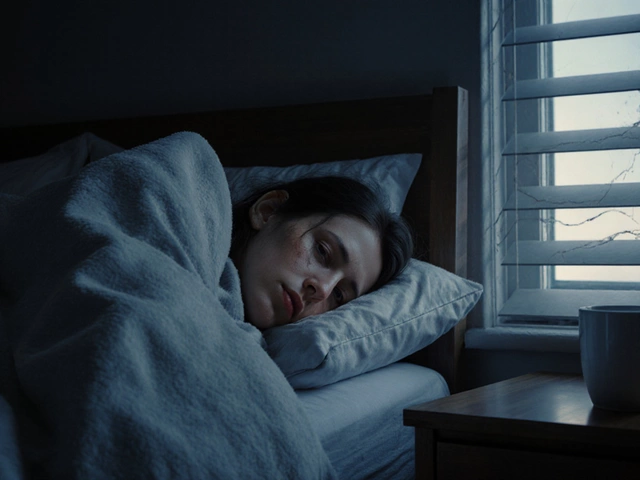Ayurvedic Golden Hour Calculator
Optimize Your Morning for Vitality
The Ayurvedic golden hour is the first 90 minutes after waking. This is when your body naturally transitions from rest to activity, making it the perfect time to set your day's rhythm. Calculate your optimal golden hour window and recommended bedtime.
Most people think of the golden hour as that magical time just after sunrise when the light turns soft and golden. But in Ayurveda, the golden hour isn’t about photography-it’s about physiology. It’s the first 90 minutes after waking up, and how you spend it can shape your entire day. Skip it, and you’re fighting your body’s natural rhythm. Honor it, and you’ll notice better digestion, sharper focus, and more stable energy-not from caffeine, but from alignment.
Why the Golden Hour Matters in Ayurveda
Ayurveda doesn’t treat the body like a machine that runs on willpower. It sees you as part of nature’s rhythm. The golden hour aligns with prana, the vital life force that flows strongest in the early morning. Between 4:00 a.m. and 6:00 a.m., the atmosphere is calm, the air is clean, and your mind is naturally quiet. This is when your body shifts from rest to activity. If you hit snooze or scroll through your phone during this window, you’re disrupting a 5,000-year-old biological protocol.
According to the Charaka Samhita, one of Ayurveda’s oldest texts, the time just after waking is when vata-the dosha linked to movement, clarity, and creativity-is most dominant. This is your window to set the tone for the day. The golden hour isn’t optional; it’s the foundation of dinacharya, the daily routine that keeps you balanced.
What Happens in Your Body During the Golden Hour
Between 4:00 a.m. and 6:00 a.m., your body does three key things:
- Your cortisol levels rise naturally to wake you up without needing an alarm.
- Your lymphatic system flushes toxins built up overnight.
- Your digestive fire, or agni, begins to stir in preparation for breakfast.
If you stay in bed past 6:00 a.m., cortisol drops and your energy crashes before you even start the day. That’s why so many people feel sluggish even after eight hours of sleep. It’s not about quantity-it’s about timing.
Modern science backs this up. A 2023 study in the Journal of Circadian Rhythms found that people who woke naturally before sunrise had 23% higher melatonin clearance and 18% better insulin sensitivity than those who slept past 6:30 a.m. Ayurveda didn’t need a lab to know this-it observed it in thousands of lives over centuries.
The Five Steps of the Ayurvedic Golden Hour
There’s no rush here. This isn’t a 5-minute hustle. It’s a gentle, intentional sequence. Do these steps in order, ideally barefoot on a cool floor.
- Wake up before 6:00 a.m. Don’t wait for an alarm. Train your body to wake naturally by going to bed by 10:00 p.m. Sleep before midnight is the most restorative.
- Drink a glass of warm water. Add a pinch of ginger or lemon if you have a kapha imbalance (feeling heavy, sluggish). This wakes up your digestive system and clears mucus.
- Scrape your tongue. Use a copper or stainless steel tongue scraper. You’ll see a white or yellow coating-that’s overnight toxins. Remove it. This alone improves taste, breath, and digestion.
- Oil your mouth and nose. Swish a tablespoon of sesame or coconut oil for 5-10 minutes (oil pulling). Then apply 2 drops of warm sesame oil in each nostril (nasya). This lubricates your sinuses, calms the nervous system, and protects against seasonal allergies.
- Move your body. 15 minutes of yoga, stretching, or walking in nature. Don’t push. Let your breath lead. Focus on inhaling through your nose and exhaling slowly.
Do this for 21 days. You won’t feel a miracle on day one. But by day 14, you’ll notice your cravings change. You’ll sleep deeper. You’ll stop reaching for sugar after lunch. That’s your body returning to its natural rhythm.

What Happens If You Skip It
Skipping the golden hour doesn’t just mean you miss a nice morning ritual. It means you’re setting yourself up for imbalance.
When you roll out of bed and grab coffee before drinking water, you’re shocking your system. The caffeine spikes cortisol, but your liver hasn’t had time to process overnight waste. That’s why you crash by 11 a.m.
When you check your phone first thing, you activate your sympathetic nervous system-the fight-or-flight mode. Your body thinks it’s under threat. Your digestion shuts down. Your immune system slows. Your mind stays scattered.
People who skip this routine often blame stress, aging, or bad luck. But the real culprit? A misaligned daily rhythm. Ayurveda calls this vikruti-a state of imbalance caused by ignoring nature’s cues.
How to Adapt It to Your Life
You don’t need to wake up at 4:00 a.m. if you’re a night shift worker or a new parent. The golden hour isn’t about the clock-it’s about the sequence.
Here’s how to adjust:
- For shift workers: Do the routine right after your sleep, even if it’s 2:00 p.m. Keep the steps in order. Warm water, tongue scraping, oil pulling-these work regardless of time.
- For parents: Do one step while your baby naps. Maybe just tongue scraping and oil pulling. Do it consistently, even if it’s only 5 minutes.
- For busy professionals: Skip yoga if you’re short on time. But don’t skip water, tongue scraping, and nasal oil. These three alone make a difference.
Consistency beats perfection. One step done daily is better than five steps done once a week.
What to Avoid During the Golden Hour
There are three big traps:
- Don’t eat breakfast right away. Wait at least 30 minutes after your routine. Your digestive fire needs time to wake up.
- Don’t use screens. The blue light suppresses melatonin and triggers stress hormones. Save emails and social media for after 8:00 a.m.
- Don’t rush. This isn’t a checklist to tick off. Move slowly. Breathe. Feel your feet on the ground. This is meditation in motion.
One woman in Kerala told me she started doing just the warm water and tongue scraping every morning. After six weeks, her chronic headaches disappeared. She didn’t change her diet. She didn’t take supplements. She just aligned her morning with her body’s rhythm.

The Bigger Picture: Ayurveda Isn’t a Trend
The golden hour isn’t a wellness hack. It’s a return to the way humans lived for thousands of years-before alarms, before coffee machines, before smartphones. Ayurveda doesn’t tell you what to do. It reminds you of what your body already knows.
This is why the golden hour works. It’s not about adding more. It’s about removing interference. You’re not trying to become someone else. You’re returning to yourself.
When you honor this time, you’re not just improving your health. You’re reconnecting with a rhythm older than medicine, older than science, older than the idea of being ‘busy.’
What Comes After the Golden Hour
After your golden hour, the rest of your day flows more easily. Your appetite returns naturally. Your mind feels clear. You don’t need willpower to eat well or sleep well-you’re already in sync.
That’s the real gift of Ayurveda. It doesn’t give you rules. It gives you freedom-from cravings, from fatigue, from the feeling that something’s always off.
The golden hour is your daily reset. Do it once, and you’ll remember why you felt so alive as a child-before you learned to ignore your body’s whispers.
Is the golden hour the same as sunrise?
Not exactly. The golden hour in Ayurveda refers to the first 90 minutes after waking, not the time of sunrise. While it’s ideal to wake before sunrise, the key is consistency in your morning routine, regardless of the clock. If you wake at 7:00 a.m., your golden hour is 7:00-8:30 a.m.
Can I do the golden hour routine if I have insomnia?
Yes, but start gently. Focus on warm water and tongue scraping first. Avoid oil pulling if you feel too drained. Try going to bed 15 minutes earlier each night until you can wake naturally. The routine itself helps regulate sleep over time by calming the nervous system.
Do I need to use sesame oil for oil pulling?
Sesame oil is traditional and best for vata and kapha types. Coconut oil works well for pitta types, especially in hot climates. If you don’t like the taste, use sunflower oil. The key is consistency-not the exact oil. Just avoid flavored or processed oils.
How long before I see results from the golden hour?
Most people notice better digestion and clearer skin within 7-10 days. Energy levels stabilize around day 14. For deeper changes-like reduced anxiety or better sleep-it takes 21-30 days. The body rebuilds rhythm slowly, but it’s lasting.
Can children follow the golden hour routine?
Yes, but adapt it. Kids don’t need oil pulling or nasal oil. Just warm water, gentle stretching, and no screens for the first 30 minutes after waking. This builds a foundation for lifelong balance.
Next Steps: Start Small, Stay Consistent
Don’t try to do all five steps tomorrow. Pick one: drink warm water as soon as you wake up. Do it for a week. Then add tongue scraping. Then oil pulling. Let each step become a habit before adding the next.
This isn’t about being perfect. It’s about showing up. Your body remembers every time you honor it. And over time, that adds up to a life that doesn’t need fixing-just remembering.

 Understanding the 4 A's of Orthopedics
Understanding the 4 A's of Orthopedics
 Best Herbal Supplement Company: How to Choose Wisely
Best Herbal Supplement Company: How to Choose Wisely
 What Is the Golden Hour in Ayurveda? The Secret to Daily Balance and Vitality
What Is the Golden Hour in Ayurveda? The Secret to Daily Balance and Vitality
 Herbal Supplements: What Are the 3 Main Supplements You Should Know?
Herbal Supplements: What Are the 3 Main Supplements You Should Know?
 What Are the 7 Types of Mental Disorders? A Clear Guide to Common Conditions
What Are the 7 Types of Mental Disorders? A Clear Guide to Common Conditions